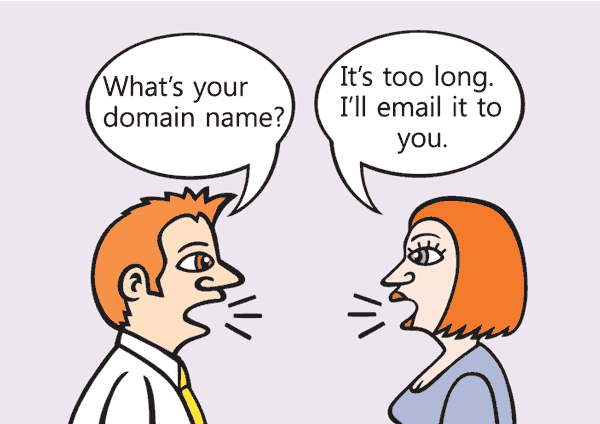
Sure – There are legitimate reasons to buy multiple domain names, but search engine traffic is not generally one of them. Keep your money in your pocket and read the rest of this post before buying extra domain names.
Good Reasons To Buy Multiple Domain Names
Reason #1 – Protecting a Brand
Large corporations usually snap up many different versions of their domain name to protect their brand and you can do the same for your small business.
The only way to keep other people from buying a domain name is buying it yourself.
So if you own johnsbestplumbing.com and you don’t want people to own johnsbestplubming.net and johnsbestplumbing.org, then you might want to buy those yourself.
Is it worth it? Maybe, maybe not.
 Let’s look at Sony Corporation for example. They are obviously a massive global company and most people would go to Sony.com to find them. Sony.com leads to their consumer electronics web site.
Let’s look at Sony Corporation for example. They are obviously a massive global company and most people would go to Sony.com to find them. Sony.com leads to their consumer electronics web site.
Sony.net leads to a different site that is their global corporate site. It appears they’ve also purchased other top level domain versions like Sony.info and Sony.org but haven’t forwarded these domains. (at least, not as of today)
They obviously aren’t worried about people typing in .info or .org to find them, but they probably figure it’s worth it to purchase these domains to keep others from purchasing them.
Sony is a multi-billion dollar brand so it makes sense to spend $10-20 per year to purchase some extra domains to protect their brand name.
Is your brand worth spending some money to protect? That’s really up to you to decide.
My recommendation would be to consider buying the .net and .com versions of your domain first. Other top level domains are not as popular so are not as important to protect.
Reason #2 – Shorter Email Domain
Many companies have long domain names because their company name is long.
For example, I built a site for client using FirstCallAdvisoryGroup.com as the domain name. Rather than using FirstCallAdvisoryGroup.com in their email addresses, they decided to buy a domain YourFirstCall.net instead so they can use that for email addresses.
Will the .net and .com switch confuse people? Possibly, but the goal was to shorten the domain name overall to use for email addresses. Overall, a smart move I think since YourFirstCall.net makes for much more manageable email addresses.

Reason #3 – Word of Mouth
This is similar to the email address issue. It’s usually difficult to remember domain names with dashes in them or domain names that are super long. If your domain is longer than 15 characters, it can be helpful to purchase a shorter, more memorable name that you can put on business cards, presentations, or just share by word of mouth.
It would be easier for someone to remember johntheplumber.com than JCprofessionalPlubmingCorp.com.
I prefer to buy domains that are short in the first place to avoid this problem, but maybe you’ve owned along domain for years already or there’s just no way around having a long domain name because your business name is long. In this case, purchasing a second domain that is shorter might be a smart move.
Not sure how to buy a domain name? Watch my video on how to search and buy a domain and Godaddy.
Reason #4 – Making Sure Your Visitors Find You
Since .com is so popular, people may just type it in without thinking, even though your site is a .net. To make sure your visitors find you, it’s smart to own a few different domains.
It’s also wise to cover common misspellings or multiple spellings. For example, if you have “collectibles” in your domain name, you might want to purchase a second version with the spelling “collectables” since that is a common spelling.
Of if you have an insignificant word like “the” in your domain, it’s smart to pick up a version of the domain without “the” in it in case your visitors leave it out.
An interesting example of this are the following domains:
bluebook.com redirects to kbb.com, the popular Kelley Blue Book car value website
thebluebook.com is a construction directory, a totally different site
I bet these two sites get a decent amount of confused visitors from people trying to find the other site. It’s great when they are gaining traffic but horrible when they are losing it.
Is there a Search Engine benefit to having multiple domains?
 There is no real search engine benefit to owning multiple domain names. If your site is on a .com and you buy the .net and .info to forward them to your website, don’t expect this to get you any extra search engine rankings. Google and other search engines will only rank your site with actual hosted content on a real website. Search engines will not index or rank domains that are forwarding to another domain.
There is no real search engine benefit to owning multiple domain names. If your site is on a .com and you buy the .net and .info to forward them to your website, don’t expect this to get you any extra search engine rankings. Google and other search engines will only rank your site with actual hosted content on a real website. Search engines will not index or rank domains that are forwarding to another domain.
Many people will purchase extra domains with other keywords in them that are related to their business or website. They think that these domains will help their website show for these keywords but since the domains have no website on them and they won’t be indexed in search engines, they will have no effect. If you were to put a website on every domain, that’s a different story, and also a large undertaking!
So if you’re going to spend money on extra domains, it should TYPICALLY only be for the reasons above.
BUT – there is a final reason that DOES have a possible SEO benefit.
Reason #5 – Purchasing Established Domains
If you’re a shrewd domain buyer, you may be able to search for domains within your industry that are established and have real value. You can purchase these domains and take advantage of the authority they possess and even the traffic they may still be receiving.
Evaluating a domain can be a pretty complex process but the first step is to find them. Many people stumble on to domains by typing them in a browser, but regardless of how you find them, you need to then measure whether or not they are valuable. Here’s a quick process I use to find the value of a domain.
- Type the domain into Archive.org to see how long it has has been established with an active website. If a website has been hosting a website for several years, the domain has some age and, like a good wine, this gives a domain value because one factor in domain rankings is the age of a domain. The thinking on the part of the search engine algorithms is that older domains are generally more authoritative and trustworthy than brand new domains.
- Type the domain in OpenSiteExplorer.com to see the Domain Authority. This is a score out of 100 that measures a domain’s ability to rank based on the domain’s popularity and incoming links. More can be said about this, but I’ll leave it there for our purposes.
- Search the domain on SemRush.com to see if it’s getting any traffic and for what keywords. Even if a domain is getting no traffic, it could still have value because of the two other factors above.
If you find a domain that you think has value, you’ll have to contact the owner to see about acquiring it and negotiate a price. After you have secured the domain, you can then forward the domain to your website and the domain authority will flow to your domain. There’s more that would need to be done to capture traffic that the domain may be getting, but I don’t want to get into the complexities of that here. Forwarding the domain is simple to do (see my short video here) and will allow you to capture most of the value from the domain you purchased.
What is My Approach?
If you’re wondering how I approach this, you’re on WebEminence.com which is my main site and I decided to buy the .net so no one else does. If you type in WebEminence.net, it will redirect you to my main .com site.
So as far as I know, other versions of my domain like .org and .info are up for grabs. I’m sure there will be a mad rush to Godaddy to snap these up 😉
Are there other reasons to own multiple domains?
Can you think of other reasons to own multiple domains? I’m sure there are some I didn’t cover. Comment below and share some other good reasons.
